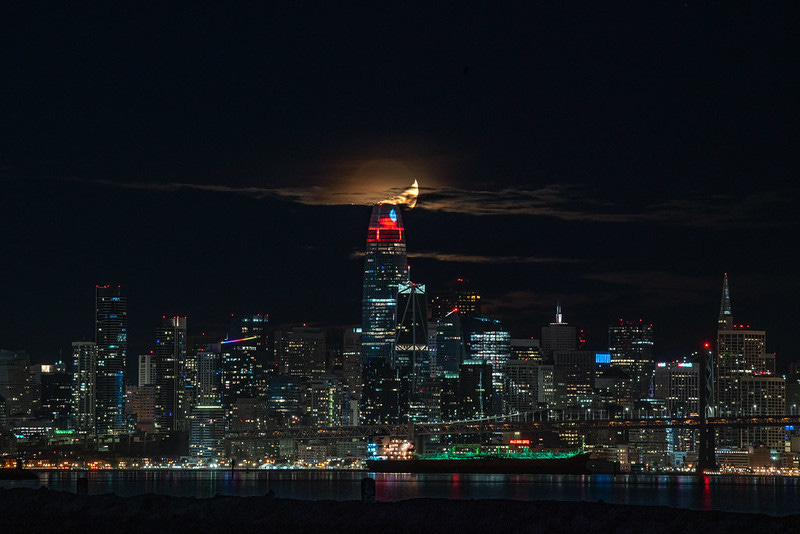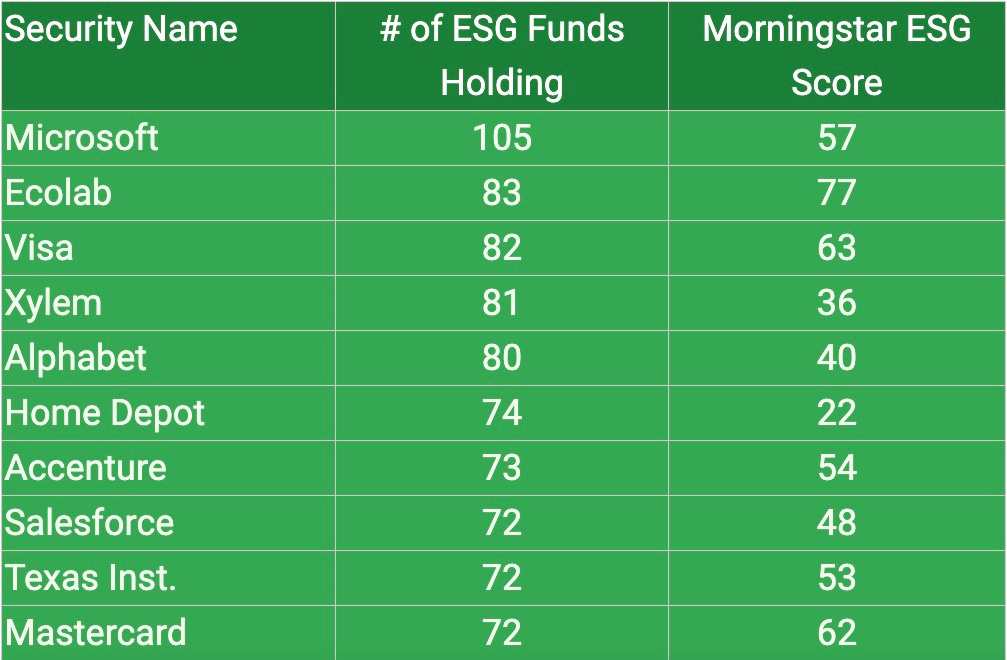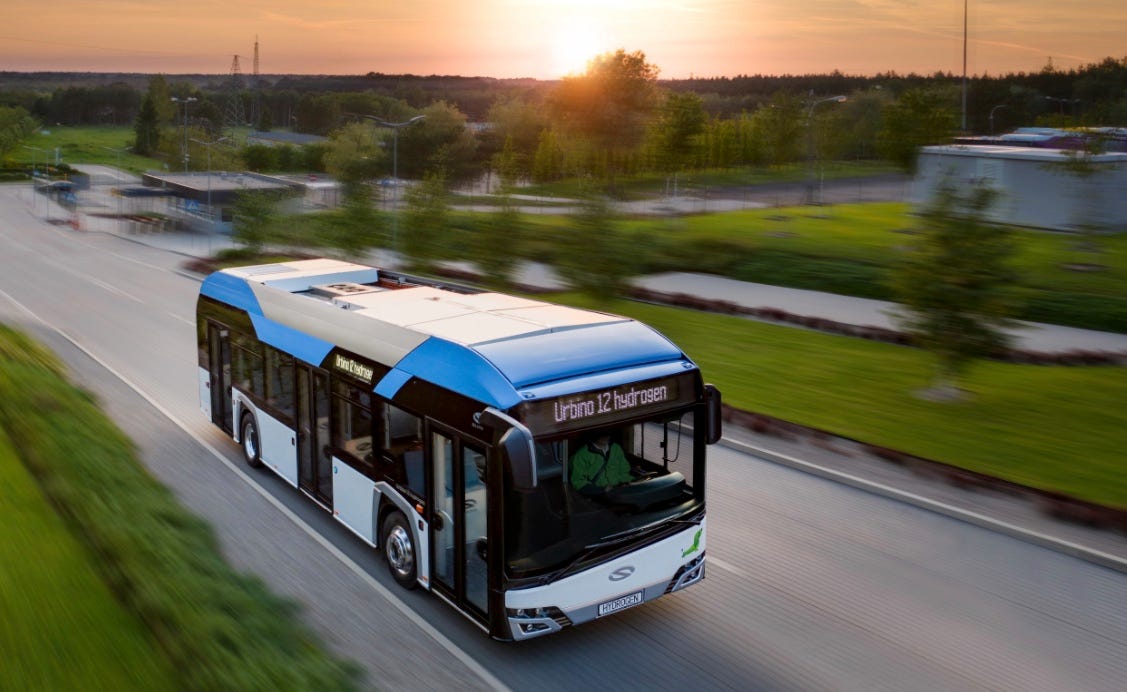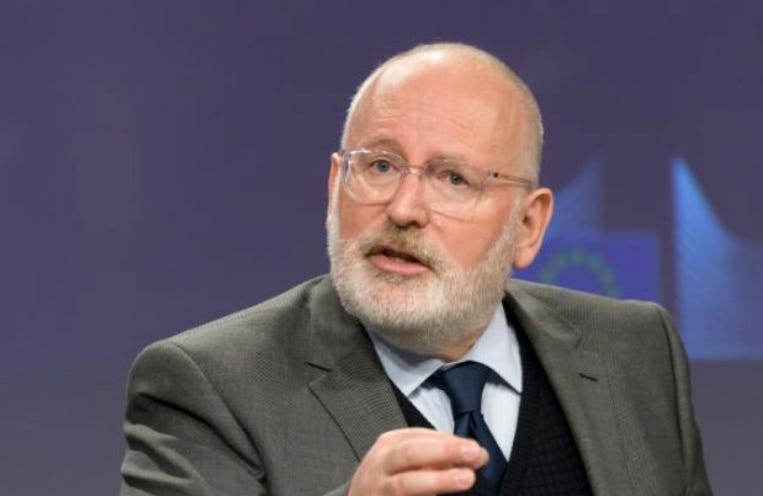The 20 most popular ESG stocks; climate's cancel culture, and Europe's hydrogen bet
Welcome to Callaway Climate Insights. Only five days until our webinar with EU Climate Chief Frans Timmermans. Please share!
Above, the 10 most commonly held stocks by equity U.S. sustainable open-end funds and ETFs as of the fourth quarter of 2020 (according to Morningstar), along with their just-released S&P Global ESG ratings.
The booming number of environmental, social, and governance funds in the past year has drawn plenty of criticism for its inclusion of Big Tech, Big Finance, even Big Oil, and a look behind the curtain at the 20 most commonly-held stocks in ESG funds shows that for the most part what they all have in common is Big Cap.
Arguments abound about why Microsoft (MSFT), Salesforce.com (CRM) and Alphabet (GOOGL) are ESG stocks, and to some extent they make sense. But we can’t help thinking that performance also plays a major role in their selection. The top 10 stocks here, courtesy of Morningstar, all boast massive values as rewards for performance, as do the next 10 on the list, including Apple (AAPL, with an S&P Global ESG score of 29), Nvidia (NVDA, with a score of 74), Cisco (CSCO, 79), Procter & Gamble (PG, 60) and Verizon (VZ, 33).
A couple of notable outliers in the list are Ireland-based Trane Technologies (TT, ESG score of 75), and Aptiv Plc (APTV, 57), the electric component maker for vehicles — though both also have massive market caps. Merck (MRK, 39), Amgen (AMGN, 59) and Adobe (ADBE, 68) fill out the top 20.
The listings are worth remembering as you read Mark Hulbert’s interview below with StoneX Global Strategist Vincent Deluard, who argues that ESG funds and holdings are not radical enough to deal with the radical change needed to fight global warming. But for the moment, that’s what they are.
Take a look at the list in terms of funds that hold these stocks and in terms of their Morningstar ESG scores, which are instructive. Oh, and in terms of performance, it’s Nvidia by a mile — up 101% over the past 12 months.
More insights below. . . .
Don’t forget to contact me directly if you have suggestions or ideas at dcallaway@callawayclimateinsights.com.
EU notebook: More than half the world’s current hydrogen projects are in Europe. Can they work?
. . . . Europe is the undisputed leader in the nascent business of green hydrogen, with more than half the world’s current projects in developing renewable energy located in the region, writes Vish Gain from Dublin. With even coal-dependent countries in Eastern Europe — such as Poland — experimenting with hydrogen, Europe has staked its clean energy future on the idea. But cost concerns and political will are formidable opponents.
Significant challenges await Europe in its hydrogen plans. While Europe plans to install 40GW of electrolyzers (equipment to produce emissions-free hydrogen using water and renewable power) this decade, it has less than 0.1 GW of electrolyzers at the moment. To put things into perspective, that’s a 400 times increase in capacity planned in the space of 10 years. . . .
‘You can’t build a better future by waging war against people’: ESG’s cancel culture
. . . . With major tech stocks topping the ESG ranks, StoneX global strategist Vincent Deluard tells Mark Hulbert why both current passive and active ESG strategies are insufficient to lead to radical change in how companies behave. The solution may lie in someone paying more taxes.
Question: But if we don’t get climate change under control first, then we could fix these other issues you raise and still end up with unsustainable societies.
Deluard: Even intelligent people, especially when they are blinded by ideology, can badly miscalculate risks. The Byzantines were famously holding a heated council on the sex of angels during the final siege of Constantinople by the Ottomans. Watching cable news during the riots in the U.S. Capitol felt a bit like that. I doubt the unfolding crises of the 2020s can be averted if the ESG movement’s ultimate effect is to funnel more money into tax-avoiding tech monopolies, pharmaceutical giants with few workers, and financial networks. . . .
Re-assessing REITs as climate plays amid disaster, green spending

. . . . There’s nothing like a climate disaster, such as we saw in Texas this week, for making investors re-evaluate their real estate plays, writes David Callaway. Real estate investment trusts (REITs) can typically provide great diversity, but the big players in the game can get hurt by regional turmoil as well. Strategists Scott Crowe and Uma Pattarkine at CenterSquare Investment Management in Philadelphia discuss their top picks, and why these energy users are ripe for a green revolution.
Feb. 23 webinar with Frans Timmermans: Don’t miss this opportunity
Our exclusive conference with European Union Climate Commissioner Frans Timmermans is coming up on Callaway Climate Insights on Tuesday, Feb. 23, and we need your help spreading the word.
Timmermans is widely acknowledged as the most influential figure in sustainability and climate change in the world. He will join several distinguished speakers, including Eamon Ryan, Ireland’s environment minister, to discuss Europe’s energy transition goals for 2030 and how it’s working with the incoming Biden Administration.
We are glad to join EY and European industry group Ibec in bringing you this special event.
Callaway Climate Insights readers who register will be able to access the link to the webinar starting at 2 p.m. GMT (9 a.m. Eastern) on Feb. 23. We will send an email out ahead of time with the link, and details on how to attend will also appear on our website.
We ask that you please share this email far and wide with your ESG and sustainability colleagues or anyone you think who might enjoy hearing about how European and U.S. climate policies are coming together, and what the major challenges are. In addition to Timmermans and Ryan, the event will feature Danny McCoy, CEO of Ibec; Rachel Bronson, president and CEO of The Bulletin of Atomic Scientists; Sarah Fay, managing director of Glasswing Ventures USA; and Marsha Vande Berg, CEO of MJV Global Insights and former CEO of the Pacific Pension and Investment Institute.
Data driven: Mauna Loa’s view of the skies

. . . . The Mauna Loa Observatory of Hawai’i, which has the longest record of direct atmospheric CO₂ measurements in the world, reported an average of 416.91 parts per million of CO₂ in the atmosphere around their observatory last week. Last year, the daily average was 414.71 ppm of CO₂ in the month of February.
News briefs: Fracking ban in California, S&P’s ESG ratings, more
Editor’s picks:
California fracking faces whacking in new bill
Amundi to demand climate goals from companies
Things go paper with Coke
Maine could be first state to grade bills’ climate impacts
Latest findings: New research, studies and projects

Fossil fuel pollution and premature death
The effects of burning fossil fuels on health may be greater than previously thought, according to new research. A study published earlier this month in the journal Environmental Research demonstrates how fossil fuel pollution may be the cause of one in five premature deaths. Hardest hit are areas in China, India, Europe and the northeastern United States, with a disproportionately high share of 8.7 million annual deaths there attributed to fossil fuels. A report from Reuters notes the new research gives the most detailed assessment of premature deaths due to fossil-fuel air pollution to date. A study in 2017 had put the annual number of deaths from all outdoor airborne particulate matter, including dust and smoke from agricultural burns and wildfires, at 4.2 million.
More of the latest research:

Words to live by . . . .
“When it comes to climate change, I know innovation isn’t the only thing we need. But we cannot keep the Earth livable without it. Techno fixes are not sufficient, but they are necessary.” — Bill Gates









